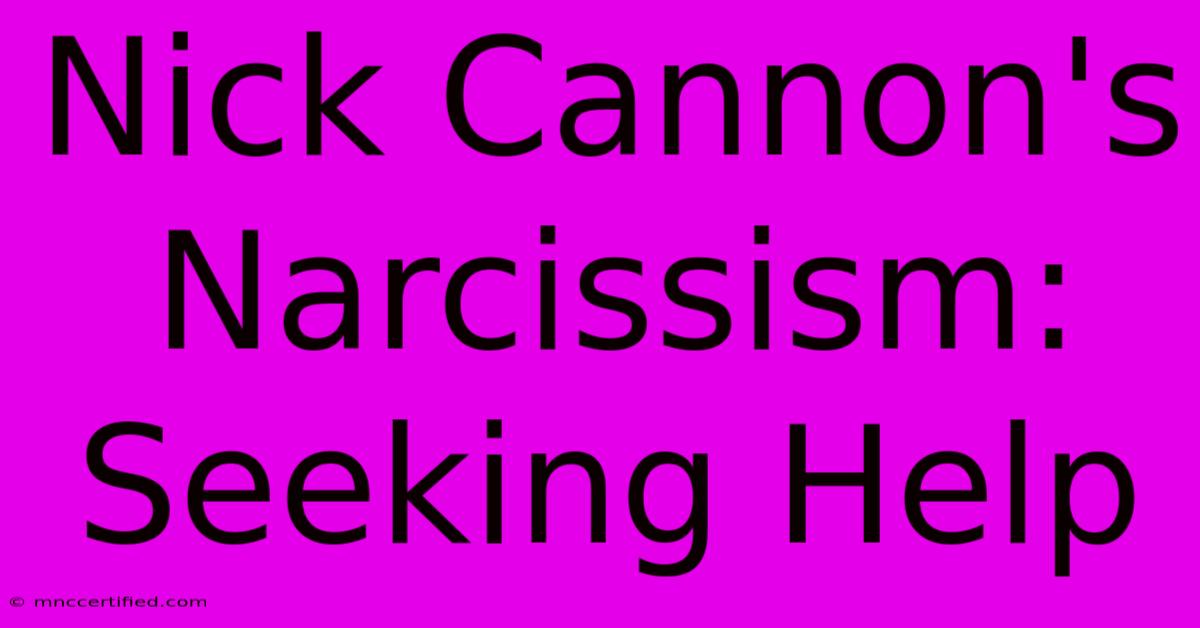Nick Cannon's Narcissism: Seeking Help

Table of Contents
Nick Cannon's Narcissism: Seeking Help, Healing, and a Path Forward
Nick Cannon, a multifaceted entertainer known for his prolific career in music, comedy, and television, has become a subject of much public discussion. Beyond his professional achievements, his personal life and relationships have sparked considerable debate, with some observers pointing to potential narcissistic traits. This article delves into the complexities of diagnosing narcissism, examines behaviors potentially indicative of the condition in Nick Cannon's life, and explores the importance of seeking professional help for healing and personal growth. It’s crucial to remember that this analysis is based on publicly available information and does not constitute a professional diagnosis.
Understanding Narcissistic Personality Disorder (NPD)
Before analyzing specific behaviors, it's vital to understand Narcissistic Personality Disorder (NPD). NPD is a personality disorder characterized by a pervasive pattern of grandiosity, need for admiration, and lack of empathy. Individuals with NPD often exhibit:
- Grandiose sense of self-importance: An exaggerated belief in their own importance and abilities.
- Preoccupation with fantasies of unlimited success, power, brilliance, beauty, or ideal love: A constant daydreaming about achieving unrealistic goals.
- Belief that they are "special" and unique and can only be understood by, or should associate with, other special or high-status people (or institutions): A sense of entitlement and superiority.
- Need for excessive admiration: A constant craving for praise and validation.
- Sense of entitlement: An expectation of favorable treatment or automatic compliance with their expectations.
- Interpersonally exploitative: Using others to achieve their own goals without regard for their feelings.
- Lack of empathy: An inability to understand or share the feelings of others.
- Often envious of others or believes that others are envious of him or her: A constant comparison to others, always striving for the "top".
- Arrogant, haughty behaviors or attitudes: A condescending and dismissive demeanor.
It's important to note that exhibiting some of these traits does not automatically equate to having NPD. A formal diagnosis requires a comprehensive evaluation by a qualified mental health professional.
Analyzing Behaviors: A Closer Look at Nick Cannon's Public Persona
Several aspects of Nick Cannon's public persona have prompted discussion about potential narcissistic tendencies. These include:
- High Number of Children: The sheer number of children Nick Cannon has fathered with multiple partners could be interpreted as a manifestation of a need for admiration and control, potentially aligning with narcissistic traits. However, it's essential to avoid making hasty judgments and consider other potential factors.
- Public Statements and Social Media Presence: Cannon’s frequent public statements and active social media presence could be seen as a constant need for validation and attention, a common characteristic associated with NPD. The content and tone of these communications may offer further insight.
- Relationships and Breakups: The dynamics of Nick Cannon's past relationships and subsequent breakups, while complex, could warrant consideration in a broader analysis of his personality. However, relationship complexities are multifaceted and do not solely define NPD.
The Importance of Seeking Professional Help
Regardless of any speculation, seeking professional help is crucial for anyone struggling with self-esteem issues, relationship problems, or behaviors indicative of a potential personality disorder. Therapy can provide:
- Self-awareness: Understanding underlying motivations and behaviors.
- Emotional regulation: Developing healthier coping mechanisms.
- Improved relationships: Building stronger, more fulfilling connections.
- Enhanced self-esteem: Developing a healthier sense of self-worth.
Therapy offers a safe and confidential space for self-reflection and personal growth. It's vital to seek the guidance of a qualified mental health professional for a proper diagnosis and treatment plan.
Conclusion: A Call for Empathy and Understanding
While discussing Nick Cannon's potential struggles with narcissism, it is essential to approach the topic with sensitivity and respect. Speculation alone cannot diagnose a personality disorder. This article aims to encourage open discussion, increase awareness about NPD, and highlight the importance of seeking professional help. Ultimately, the focus should be on promoting healing and personal growth, regardless of whether an individual receives a formal diagnosis. Remember to treat individuals with empathy and refrain from making judgments based solely on public perception. We should strive for understanding and compassion in navigating such complex issues.

Thank you for visiting our website wich cover about Nick Cannon's Narcissism: Seeking Help. We hope the information provided has been useful to you. Feel free to contact us if you have any questions or need further assistance. See you next time and dont miss to bookmark.
Featured Posts
-
Greenville County Bond Court
Nov 30, 2024
-
The Madness Netflix Cast Plot Release Date
Nov 30, 2024
-
Barbour Commander James Bond
Nov 30, 2024
-
Pi Network Price In Pakistan
Nov 30, 2024
-
Barry Bonds 1986 Rookie Card
Nov 30, 2024